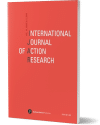Danilo Streck, editor- in-chief of the Budrich journal IJAR – International Journal of Action Research, agreed to reply to our 5 questions. Before we start, a short CV is given by Mr. Streck:
 Doctor of Education from Rutgers University
Doctor of Education from Rutgers University- Professor at the Graduate School of Education of the Universidade do Vale do Rio dos Sinos (Unisinos University), Brazil
- visiting scholar at the Latin American Center, UCLA, and at Max Planck Institute for Human Development in Berlin
- visiting lecturer at the University of Toronto and University of Siegen
- Recent research projects focus on popular education, Latin American pedagogy, pedagogical mediations in participatory social processes, and participatory research methodologies.
What will be the main challenge for your research field in the coming years?
One of the main challenges concerns the education of and for an effective and responsible global citizenship. There are specific problems in each country and region, but today these are connected in a world-system that requires a new pedagogical perspective. I have been especially concerned with the epistemological and methodological issues, as much in teaching/learning as in research. This is why action research and participatory research methods in general have been of particular interest.
Why would anyone want to pursue research in your field?
A well-known aphorism by Paulo Freire is that education alone will not change the world, but at the same time one cannot imagine significant and lasting changes without education. Building an awareness of what education is about or should be about, nationally and internationally, is today an imperative dictated not only by technology and its advances, but by the present and future we envision for life on this planet.
Why did you choose your research field? What motivates you in your field in particular?
At the first and Second World Social Forum in Porto Alegre (Brazil), under the slogan “Another world is possible”, social scientists and activists claimed for the search of a “new social contract”. In this socio-political context, I became interested in understanding the pedagogical dimension in non-formal and informal emancipatory social processes, such as the participatory budget. I am convinced that a pedagogical look at these processes is fundamental for developing a participative, critical and responsible citizenship.
Which (academic) book has influenced you the most?
Pedagogy of the Oppresed by Paulo Freire has been a landmark for me since I came in contact with the book during my graduate studies in the US at a time when it was banned from Brazilian universities. Ironically, after 50 years, it is again under heavy attack from those who fear an education that empowers each one “to say his/her own word“.
I am author with Barbara Budrich because …
Barbara Budrich kindly accepted to host the International Journal of Action Research. I had known the quality of the publications and the editorial line of Barbara Budrich before, and expect to collaborate and learn with her work for a long time.
Danilo Streck at Budrich:
 IJAR – International Journal of Action Research
IJAR – International Journal of Action Research
© header image: Sketchify , created with canva.com; portrait Danilo Streck: private

